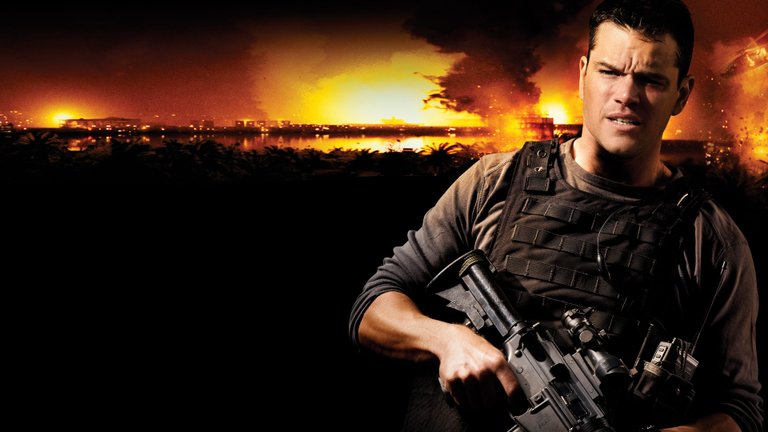Film Review: Green Zone (2010)

The 2003 US invasion of Iraq is widely regarded as one of the most colossal geopolitical blunders of the past fifty years, fundamentally reshaping the global landscape in profoundly negative ways. In its aftermath, Hollywood emerged as a platform for dissent, producing a series of films that questioned the motives and consequences of the war. This wave of cinematic critique coincided with the latter years of George W. Bush's presidency. However, once Bush left office, both Hollywood and the public seemed to lose interest in scrutinising the implications of traumatic and embarrassing chapter in American history. Among the last significant attempts to provide a critical perspective on these fateful decisions was Green Zone, a 2010 action thriller directed by Paul Greengrass. Despite its ambitious intentions, the film ultimately faltered both commercially and critically.
Green Zone draws inspiration from Rajiv Chandrasekaran's 2006 book Imperial Life in the Emerald City, which chronicles the first two years of US occupation in Iraq through the lens of US intelligence, military, and government officials trying to run the country from within the heavily fortified Green Zone in Baghdad. The book presents a stark portrayal of mismanagement and disillusionment during a time when America’s presence in Iraq was justified by claims of weapons of mass destruction (WMDs).
The film opens on March 19, 2003, coinciding with the commencement of US bombing campaigns in Iraq, after which Iraqi Army General Mohammed Al-Rawi (Ygal Naor) goes into hiding, Weeks later, after capture of Baghdad, US Army Chief Warrant Officer Roy Miller (played by Matt Damon) is tasked with leading a team to uncover alleged caches of WMDs—an essential justification for the invasion. However, Miller's relentless searches yield no results, despite assurances from his superiors that reliable intelligence exists. This growing frustration leads him to question the validity of the intelligence reports that underpin his missions. During one chaotic encounter in Baghdad, he meets Freddy (played by Khalid Abdala), an Iraqi veteran who reveals a secret meeting involving Al-Rawi and other former officials from Saddam Hussein's Ba’ath Party. Miller's attempts to apprehend Al-Rawi are thwarted when he escapes, leaving behind only a notebook that could aid Miller's investigation. As Miller grapples with his doubts about WMDs, he faces resistance from Clark Poundstone (played by Greg Kinnear), a Pentagon official committed to maintaining the official line that supports disbanding the Iraqi Army and installing exiled politician Ahmad Zubaidi (played by Raad Rawi) as head of a new government—despite his lack of legitimacy among the Iraqi populace.
Paul Greengrass initially appeared to be an ideal choice for directing Green Zone, given his previous work on politically charged docudramas like Bloody Sunday and United 93. With co-writer Brian Helgeland, Greengrass aimed to argue that the Iraq War was initiated under false pretences. However, this critique could have been less impactful had the invasion led to genuine democratic progress in Iraq or stability in the Middle East. Unfortunately, such opportunities were squandered early on due to a series of misguided decisions made by the Bush administration—decisions embodied by Poundstone's character—and these blunders went largely unchallenged by a press that appeared complacent, represented in the film by Wall Street Journal reporter Lawrie Dayne (played by Amy Ryan). The decision to disband the Iraqi Army eliminated a crucial stabilising force in an already fragmented society, resulting in rampant sectarian violence and transforming well-trained soldiers into insurgents who would go on to inflict significant casualties on American forces.
While Greengrass's intentions may have been noble, Green Zone ultimately fails in its execution. The film’s most significant flaw lies in its choice to present a complex political narrative within the confines of a standard action thriller format. This decision inevitably simplifies characters and reduces them to one-dimensional stereotypes—including Miller himself—thus undermining any potential for nuanced storytelling. Even Matt Damon's considerable talent struggles against this limitation.
Moreover, Greengrass's signature cinema verité style—a technique characterised by handheld cameras and rapid editing—feels misplaced within this context. While effective in earlier works like United 93 and even within his Bourne series, this approach creates confusion rather than clarity in Green Zone, making it difficult for audiences to fully engage with both characters and situations depicted onscreen.
The end result is an unsatisfactory compromise between serious political drama and an action-packed fantasy reminiscent of Rambo. This hybridisation does little to satisfy fans of either genre; viewers aware that history will not conclude happily are left feeling disillusioned.
Despite featuring several intriguing scenes that provoke contemplation about what went wrong in Iraq and how such mistakes can be prevented in future conflicts, Green Zone remains largely a wasted opportunity. The film’s failure is compounded by an unsettling realisation: many hard lessons from Iraq have gone unheeded, raising concerns that history may repeat itself under even more dire circumstances.
RATING: 3/10 (+)
Blog in Croatian https://draxblog.com
Blog in English https://draxreview.wordpress.com/
InLeo blog https://inleo.io/@drax.leo
Hiveonboard: https://hiveonboard.com?ref=drax
Rising Star game: https://www.risingstargame.com?referrer=drax
1Inch: https://1inch.exchange/#/r/0x83823d8CCB74F828148258BB4457642124b1328e
BTC donations: 1EWxiMiP6iiG9rger3NuUSd6HByaxQWafG
ETH donations: 0xB305F144323b99e6f8b1d66f5D7DE78B498C32A7
BCH donations: qpvxw0jax79lhmvlgcldkzpqanf03r9cjv8y6gtmk9
Posted Using InLeo Alpha